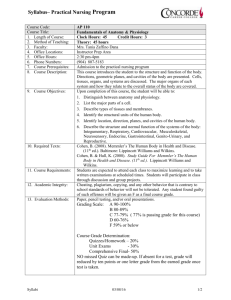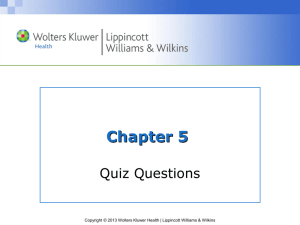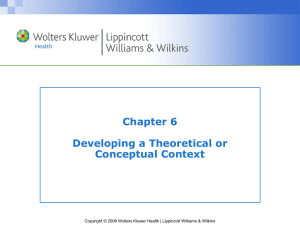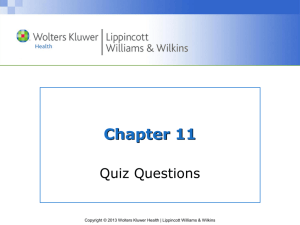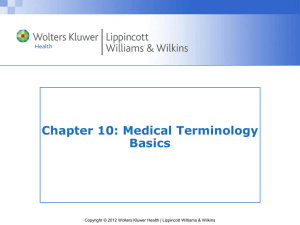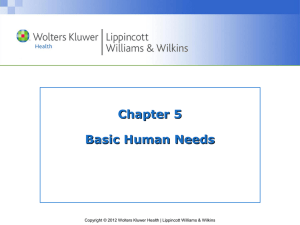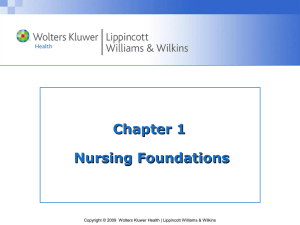Airgas template
advertisement
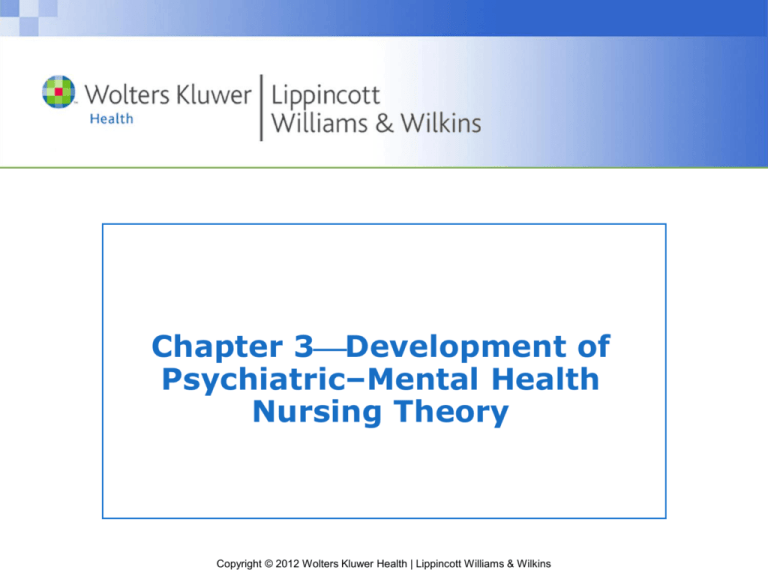
Chapter 3Development of Psychiatric–Mental Health Nursing Theory Copyright © 2012 Wolters Kluwer Health | Lippincott Williams & Wilkins By unfolding the development of our theoretical past, we gain insights that improve our understanding of our current progress, and we are empowered to achieve our disciplinary goals. By looking at our theoretical present, we see shadows of our past, as well as visions of our future. Reconstructing our theoretical heritage is a process that involves reconstructing our present reality. Meleis, 2007 Copyright © 2012 Wolters Kluwer Health | Lippincott Williams & Wilkins Learning Objectives After studying this chapter, you should be able to • Compare and contrast the terms conceptual framework and theoretical hypothesis • Explain the purpose of theory • Describe three types of theory used in psychiatric nursing • Analyze the theories of Hildegard Peplau, Dorothea Orem, Sister Callista Roy, Martha Rogers and Rosemarie Parse, and Madeline Leininger • Discuss the relationship between nursing theory and research • Articulate how nursing theory is applied to practice • Interpret the phrase eclectic approach Copyright © 2012 Wolters Kluwer Health | Lippincott Williams & Wilkins Theory Theories can • Be tested • Be challenged • Be modified • Be replaced • Become obsolete Copyright © 2012 Wolters Kluwer Health | Lippincott Williams & Wilkins Nursing Theories • Peplau’s interpersonal theory • Orem’s behavioral nursing theory • Roy’s theory of adaptation • Parse’s theory of human becoming • Leininger’s theory of cultural care diversity and universality Copyright © 2012 Wolters Kluwer Health | Lippincott Williams & Wilkins Application to Practice • Needs-oriented approach • Interaction-oriented approach • Outcome-oriented approach • Eclectic approach Copyright © 2012 Wolters Kluwer Health | Lippincott Williams & Wilkins Agreement Among Nursing Theorists • Nursing theories offer a beginning articulation of what nursing is and what roles nurses play. • Nursing theories provide descriptions of how to help clients become comfortable, deliver treatment with the least damage, and enhance high-level wellness. • Nursing theories offer a beginning common language and agreement about who the nursing care recipients are. • Nurses should not view the recipients only through biologic glasses or psychological glasses but rather through holistic glasses. • Recipients have needs, and nursing assists them in meeting those needs. Copyright © 2012 Wolters Kluwer Health | Lippincott Williams & Wilkins The role of nurses is to provide therapeutic care so that clients are able to adapt to the environment and meet identified needs related to selfcare ability, health, and well-being. Copyright © 2012 Wolters Kluwer Health | Lippincott Williams & Wilkins Key Terms • Behavioral nursing theory • Nursing theory • Cognator • Outcome-oriented approach • Conceptual framework • Regulator • Cultural care diversity and universality theory • Systems-oriented theory • Eclectic approach • Theory • Interaction-oriented approach • Theory of adaptation • Theoretical hypothesis • Interpersonal theory • Theory of human becoming • Needs-oriented approach • Tidal model Copyright © 2012 Wolters Kluwer Health | Lippincott Williams & Wilkins Reflection • Do the psychiatric nursing and nursing theories by Peplau, Orem, Roy, Parse, and Leininger remain appropriate, or should modifications be considered to meet the multifaceted needs of clients in the 21st century? ? Copyright © 2012 Wolters Kluwer Health | Lippincott Williams & Wilkins
